Activity Level: Average
Hypoallergenic: No
Social Ability: Friendly
Skills: Alerting, Tricks, Companionship
Intelligence: Above Average
Ideal Climate: Temperate
The national dog of Cuba, the Havanese is a beloved toy dog with a long history at the sides of noblemen. Their lineage was almost lost to history in the twentieth century, but their charm and wits helped them get back into the spotlight. Today, they stand at 25th most popular pure breed in the US.
Breed Overview
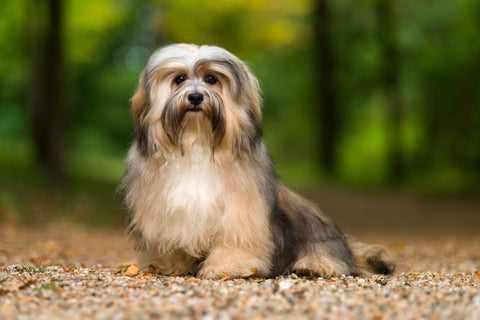 Origin: Believed to have originated in Tenerife of the Canary Islands, the Havanese are a part of the Bichon family, sharing ancestors with the Maltese and Bichon Frise. Historical records show the first recognition of the Havanese as early as the sixteenth century, when Spanish colonizers arrived in Cuba. The noblemen and upper classmen began adopting these dogs as companions, and eventually they bred with very few other canines, keeping their bloodline exclusively Havanese. By the eighteenth century, Europeans in Havana discovered the breed, kicking off the wave of adoration that would continue for centuries.
Origin: Believed to have originated in Tenerife of the Canary Islands, the Havanese are a part of the Bichon family, sharing ancestors with the Maltese and Bichon Frise. Historical records show the first recognition of the Havanese as early as the sixteenth century, when Spanish colonizers arrived in Cuba. The noblemen and upper classmen began adopting these dogs as companions, and eventually they bred with very few other canines, keeping their bloodline exclusively Havanese. By the eighteenth century, Europeans in Havana discovered the breed, kicking off the wave of adoration that would continue for centuries.
History: After eons of comfortable living amongst the European upper class in Cuba, the upward trend of the Havanese would come to a sudden halt. The Cuban Revolution kicked off a mass exodus of the upper and lower classes from the island to mainland America. Those displaced sacrificed everything they had to escape to safety, and unfortunately their dogs almost never made it off the island. Eventually, eleven Havanese dogs would be registered in mainland America, and they would become the foundation for the breed as we know it today. Through careful preservation efforts, these canines produced dozens of offspring, continuing the bloodline with great success. The American Kennel Club would recognize the breed officially two decades later in 1996, where they currently rank 25th most popular dog breed in the US.
Breed Attributes
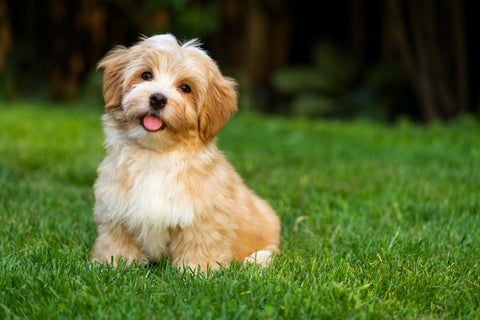 Temperament: Havanese dogs are known for their laid-back attitude and calm demeanor. Owners looking for a relaxed dog to keep them company at home often choose this breed, and these dogs take their roles as companions very seriously. Incredibly affectionate and open to new friends, their temperament has been called ‘charming,’ and every owner would agree.
Temperament: Havanese dogs are known for their laid-back attitude and calm demeanor. Owners looking for a relaxed dog to keep them company at home often choose this breed, and these dogs take their roles as companions very seriously. Incredibly affectionate and open to new friends, their temperament has been called ‘charming,’ and every owner would agree.
Havanese dogs are also very vigilant and aware of their surroundings. They can be great alert or watch dogs, but their size does not lend itself to guarding or protection. Barking should not be an issue, as they are not too vocal, but they may bark at approaching visitors or the phone ringing.
Personality: Every dog is different, but you can count on your Havanese to be sweet and loyal, with a calm attention to their surroundings. This habit helps them feel comfortable and confident, and the opposite can be true as well; a loud or highly active environment may contribute to anxiety or nervousness. Be mindful of your pet’s comfort level around people and adjust their surroundings if needed.
Ideal Owner: You! Havanese dogs are outstanding companions with big hearts and sweet eyes to match. Their small size is great for apartments and cities, but they can adapt to just about anywhere.
Fur Care
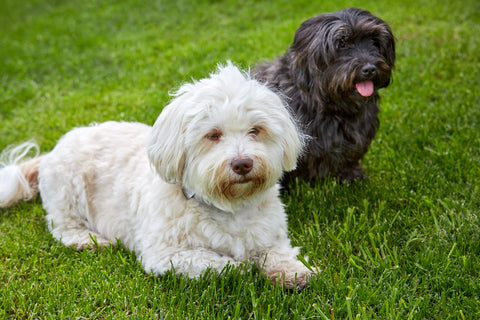 Grooming: Grooming a Havanese is thankfully only as labor-intensive as you’d like it to be. Their thick undercoat can be managed with regular brushing, and their longer outer fur can be cut and shaped to keep at-home grooming easy. A professional groomer can trim their coat and give you tips on taking care of their specific cut.
Grooming: Grooming a Havanese is thankfully only as labor-intensive as you’d like it to be. Their thick undercoat can be managed with regular brushing, and their longer outer fur can be cut and shaped to keep at-home grooming easy. A professional groomer can trim their coat and give you tips on taking care of their specific cut.
When it comes to bathing, regular baths are essential for small dogs. Because of their short legs, their torso is very close to the ground and therefore picks up more dirt than a larger dog’s would. Gentle grooming wipes can keep their tummy and paws clean between baths, and a simple shampoo for Havanese dogs is an essential part of your pet’s grooming routine.
Havanese dogs’ white fur is part of their beautiful look, but it can be hard to keep it bright. Our Bright Whitening Shampoo has you covered. This gentle and peroxide-free formula leaves their coat lustrous, shiny, and brilliant.
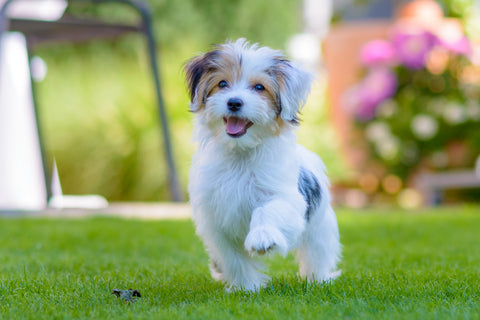 Shedding: Havanese dogs, being of the Bichon family, shed less than the average dog. If their fur is well-maintained and healthy, their coat should only shed mildly with the exception of molting seasons in spring and autumn. If your dog seems to shed more than usual, or their skin is dry and itchy, they may be in need of nutrients they aren’t getting from their food. Veterinarians often recommend supplementing their diet with omega 3 fatty acids to support skin hydration and dermatological health. By supporting their skin from the inside out, omega 3s contribute to normal and healthy shedding.
Shedding: Havanese dogs, being of the Bichon family, shed less than the average dog. If their fur is well-maintained and healthy, their coat should only shed mildly with the exception of molting seasons in spring and autumn. If your dog seems to shed more than usual, or their skin is dry and itchy, they may be in need of nutrients they aren’t getting from their food. Veterinarians often recommend supplementing their diet with omega 3 fatty acids to support skin hydration and dermatological health. By supporting their skin from the inside out, omega 3s contribute to normal and healthy shedding.
Colors: White and tan
More to Know: Havanese dogs are so recognizable by their unique, “springy” gait, it is a part of their breed standard.
Health
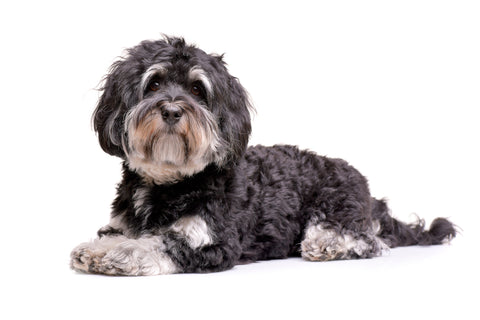 Common Issues: Havanese canines are generally healthy and can live long, happy lives. They are prone to a handful of health concerns that owners should be aware of. Be sure to ask your veterinarian about common conditions and signs to look out for.
Common Issues: Havanese canines are generally healthy and can live long, happy lives. They are prone to a handful of health concerns that owners should be aware of. Be sure to ask your veterinarian about common conditions and signs to look out for.
They are predisposed to joint conditions including Legg-Calve-Perthe Disease, patellar luxation, and chondrodysplasia. These concerns can be serious, but an examination by your veterinarian may detect early warning signs. Even if your dog’s joints seem to be healthy, they still need nutritional support to maintain those strong joints. A joint supplement is a great way to add essential nutrients to your dog’s diet every day.
Other health problems to which Havanese dogs are predisposed are often diagnosed at birth, such as deafness. Dogs with disabilities can live healthy and happy lives with proper care and adjustments; we recommend speaking to your local animal shelter representative about adopting a disabled dog for more information.
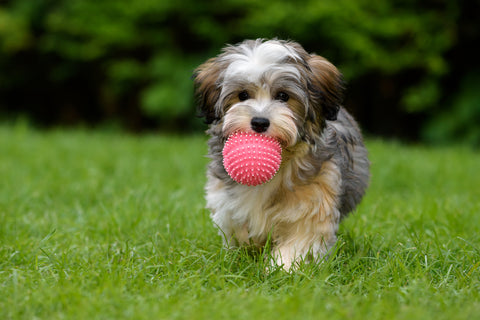 Havanese dogs are known to be affectionate, nigh clingy, which means they are prone to separation anxiety. Their owner is their leader and their best friend, so time spent apart can be stressful. Talk to your veterinarian about canine anxiety and be sure to listen to your dog. Hiding, barking, and destructive behavior are all common signs of stress and anxiety that should not be ignored. Lifestyle changes such as crate training or the use of automatic toys can help keep your dog at ease when you’re gone
Havanese dogs are known to be affectionate, nigh clingy, which means they are prone to separation anxiety. Their owner is their leader and their best friend, so time spent apart can be stressful. Talk to your veterinarian about canine anxiety and be sure to listen to your dog. Hiding, barking, and destructive behavior are all common signs of stress and anxiety that should not be ignored. Lifestyle changes such as crate training or the use of automatic toys can help keep your dog at ease when you’re gone
Nutrition: All dogs need high-quality sources of protein in their diet, such as poultry and fish. Their food should be meat-based and contain added vitamins and minerals. Even the best commercial pet foods often lack essential nutrients such as omega 3 fatty acids, which can be added to their diet with a simple daily supplement. Many veterinarians also recommend a daily multivitamin for dogs to boost their nutritional intake and support immunity, digestion, and more.
Lifespan: 14-16 years
Physical Activity
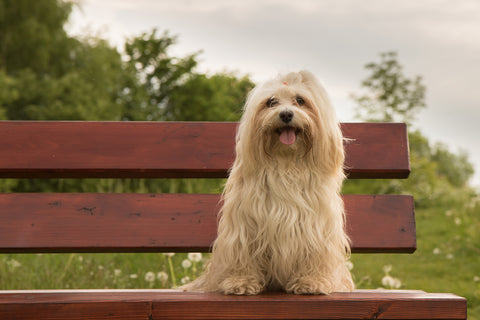 Training: Training a Havanese is an important part of bonding and establishing yourself as their owner and leader. This breed is known for their alert and loyal nature, which lends itself to trainability. Obedience training and crate training can both help your dog follow your lead, respond to commands, and stay calm when meeting strangers. Crate training is specifically recommended for Havanese dogs because it can help manage separation anxiety as mentioned above.
Training: Training a Havanese is an important part of bonding and establishing yourself as their owner and leader. This breed is known for their alert and loyal nature, which lends itself to trainability. Obedience training and crate training can both help your dog follow your lead, respond to commands, and stay calm when meeting strangers. Crate training is specifically recommended for Havanese dogs because it can help manage separation anxiety as mentioned above.
As toy-sized dogs, they can be prone to Small Dog Syndrome, a case in which a small dog ‘gets away’ with behaviors a larger dog would not, such as jumping on a human’s legs. It is important to divert these behaviors as they are signs of dominance that may lead to more bad behavior. Ask your veterinarian about behavior management and obedience classes near you.
Exercise: All dogs need a physical outlet for their energy, and running outside is a favorite for almost every canine. Your Havanese needs at least two play sessions, ideally outside, and one to two walks every day. This allows them to smell, see, hear, and interact with their surroundings, enriching their mind and their senses. This can also contribute to lower anxiety levels as they become more familiar with and comfortable in their environment.
Small dogs tend to jump more than their larger peers, which puts more pressure on their joints. To support healthy joints and nourish achy joints, our Z-Flex formula supports cartilage and tissues for mobility and flexibility.

Havanese dogs have been a beloved breed for centuries, and they remain so to this day. If you are in need of a loyal, affectionate, and smart dog, the Havanese is the one for you.

